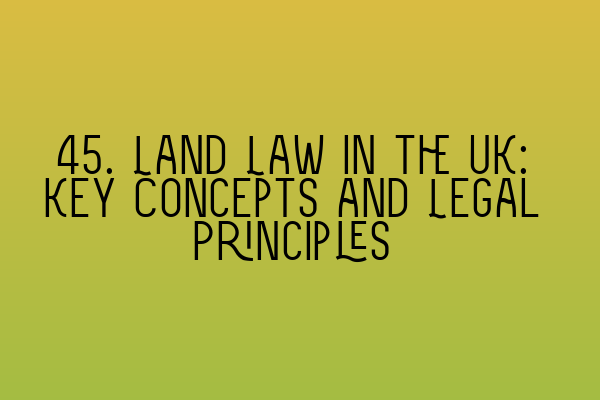45. Land Law in the UK: Key Concepts and Legal Principles
Land law plays a crucial role in the UK legal system, governing the rights and obligations associated with land and its use. Understanding the key concepts and legal principles of land law is essential for solicitors practicing property law. In this article, we will explore these concepts and principles, providing you with a comprehensive overview.
1. Freehold and Leasehold Estates:
In land law, estates refer to the level of ownership a person has over a particular piece of land. The two main types of estates are freehold and leasehold. Freehold estates grant the owner full rights and control over the land, while leasehold estates involve a lease agreement where the tenant has a limited period of occupancy.
2. Registered and Unregistered Land:
The UK operates a dual system for land registration – registered and unregistered. Registered land is governed by the Land Registration Act 2002 and provides a conclusive record of land ownership. Unregistered land, on the other hand, relies on outdated and fragmented records, making it more susceptible to disputes.
3. Adverse Possession:
Adverse possession refers to the acquisition of land by someone who is not the legal owner but has used the land as their own for a specified period. This concept allows individuals to claim ownership of unregistered land after occupying it for a certain duration and meeting specific requirements.
4. Easements and Covenants:
Easements are rights that benefit one piece of land at the expense of another. Examples include a right of way or a right to access a neighboring property. Covenants, on the other hand, are legally binding obligations that run with the land, such as maintaining a fence or paying annual fees. Both easements and covenants play a significant role in property transactions and development.
5. Mortgages:
A mortgage is a legal agreement where a borrower uses their property as collateral to secure a loan from a lender. The lender holds a mortgage over the property until the borrower repays the loan. Land law governs the creation, enforcement, and discharge of mortgages, ensuring the protection of both borrower and lender rights.
6. Co-ownership:
Co-ownership arises when two or more individuals jointly own a property. This can occur through joint tenancy or tenancy in common. Joint tenancy includes the right of survivorship, meaning if one co-owner passes away, their share automatically transfers to the remaining co-owner(s). Tenancy in common, on the other hand, allows each co-owner to have a specific share and the freedom to dispose of their share independently.
7. Trusts:
Trusts play a vital role in land law, particularly in situations where legal and beneficial ownership are separate. Trusts allow someone (a trustee) to hold and manage property on behalf of another person or group of people (beneficiaries). Trusts provide flexibility and ensure the protection and distribution of property interests according to the settlor’s intentions.
8. Landlord and Tenant:
The relationship between landlords and tenants is governed by both land law and tenancy law. Landlords have a legal duty to maintain the property, while tenants have a responsibility to pay rent and adhere to the terms of the lease agreement. Land law provides the framework for resolving disputes and ensuring fair treatment of both parties.
9. Planning and Development:
Land law also intersects with planning and development regulations. Local authorities have the power to grant planning permission for specific uses, development, or changes to land and buildings. These regulations aim to control and manage land use, ensuring sustainable development and the protection of the environment.
10. Land Disputes and Resolutions:
Land disputes can arise due to issues such as boundary disputes, rights of way, or breaches of covenants. Resolving these disputes often involves negotiations, mediation, or court proceedings. Understanding land law and legal principles is crucial for solicitors when advising clients and seeking favorable outcomes in such disputes.
In conclusion, land law plays a vital role in the UK legal system, governing various aspects of land ownership, rights, and obligations. This article has provided an overview of key concepts and legal principles in land law, including freehold and leasehold estates, registered and unregistered land, adverse possession, easements and covenants, mortgages, co-ownership, trusts, landlord and tenant relationships, planning and development regulations, and land dispute resolutions.
For more information on preparing for the SQE exams, check out our related articles:
– SQE 1 Practice Exam Questions
– SQE 1 Practice Mocks FLK1 FLK2
– SQE 2 Preparation Courses
– SQE 1 Preparation Courses
– SRA SQE Exam Dates
Remember, a solid understanding of land law is essential for solicitors practicing property law in the UK. Stay informed, updated, and well-versed in the intricacies of land law to provide the best possible legal advice and solutions for your clients.
